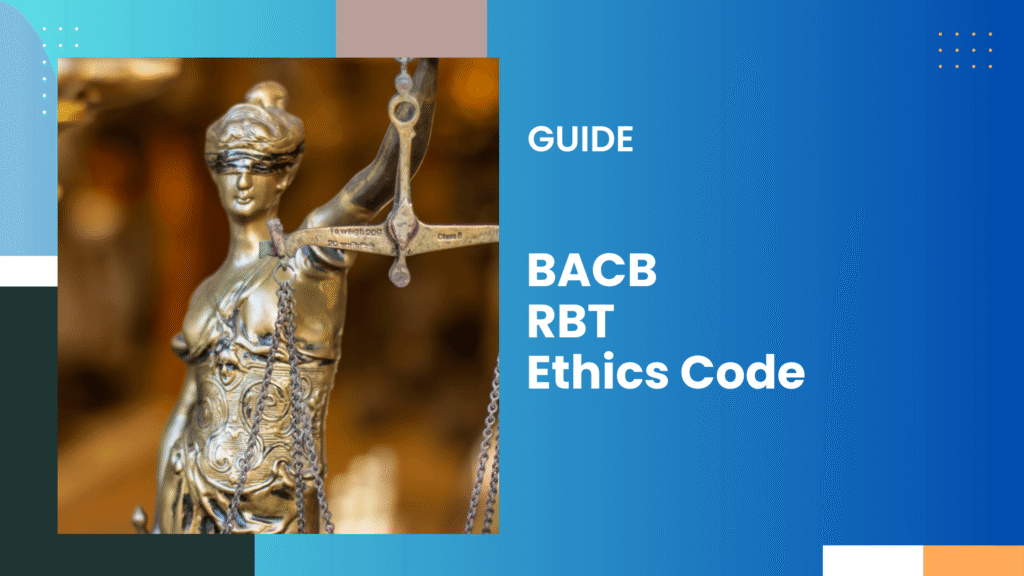BACB RBT Ethics Code 2.0: Your Complete Guide Simplified

Explore BACB RBT Ethics Code to respect client dignity, maintain confidentiality, avoid conflicts of interest, and deliver competent, ethical behavior-analytic services as a trusted Registered Behavior Technician.
The RBT Ethics Code isn’t just a list of rules; it’s basically your guide to being professional, respectful, and legal on the job.
From learning this code, you will be aware of what you can and can’t do. It’s what your BCBA expects you to follow.
And yes, if you break it, you could lose your RBT certification.
What Is the RBT Ethics Code?
The RBT Ethics Code is a rulebook you must follow when working as a behavior technician. It covers how you treat clients, what kind of work you’re allowed to do, and how to stay out of trouble with your supervisor or the BACB.
There are 3 main sections in the newest version:
- General Responsibilities
- Providing Behavior Technician Services
- Working with the BACB & Your Supervisor
You’ll hear people call this the “Ethics Code 2.0.”
This version started in January 2022 and replaced the older 2018 code.
Section 1: General Responsibilities
1. Be Honest
Honesty is the best policy, and it holds true here as you must tell the truth and cannot lie on your reports, emails, or in person.
For example, let’s say you forgot to collect data, you tell your BCBA and don’t fake it.
2. Stay Professional
This is a no-brainer, but you need to show up on time, follow through on tasks, and act respectfully even when no one is watching.
3. Work Only Under Supervision
You’re not a BCBA.
Basically, this means you can’t take on new cases or act alone. You always need an assigned supervisor.
4. Don’t Be Your Supervisor’s Boss
You can’t be their manager, employer, or HR rep. That will lead to a conflict of interest.
5. Don’t Lie About Credentials
This one is funny, but you can only use the RBT title if your certification is active. No exaggeration on your resume is allowed.
6. Stay Within Your Scope
You’re only allowed to do tasks your supervisor trained you to do.
That means you don’t create a behavior plan unless your BCBA told you to and trained you on how.
7. Practice Cultural Awareness
There are situations where you must be extra aware and need to be respectful with clients of all backgrounds, and check your own biases.
8. No Harassment or Discrimination
I want you to be fair and treat everyone equally, doesn’t matter who it is – your clients, coworkers, and family. No excuses.
9. Address Personal Issues
Your personal life can’t affect your work quality. So, if you’re going through something (mental health, legal, etc.) that affects your work, talk to your supervisor and document the plan.
10. Avoid Multiple Relationships
No mixing roles, and that means you cannot be your client’s babysitter, friend, or neighbor all at once. If one happens by accident, report it fast.
11. Gift Policy: $10 Max
Don’t give or take gifts over $10.
And yes, no regular gifts, even if it is small ones, as they create a sense of obligation.
12. No Romantic Relationships
This is pretty self-explanatory and common sense, but do not date clients, their family, or supervisors.
Not during work, and not until a safe amount of time has passed.
Section 2: Providing Behavior Technician Services
1. Always Do No Harm
You’re there to help your client, not just “get through the session.”
2. Follow the Plan
You must do what your supervisor tells you, especially if it’s in a behavior plan.
3. Act Professionally at All Times
Whether you’re in a session, in training, or just texting your BCBA, you must always be professional.
4. Don’t Use Strategies You Weren’t Trained On
You cannot improvise and follow different rules and make up as you go along. If you haven’t been taught how to use a certain method, just don’t do it.
5. Use Restrictive or Punishment-Based Strategies Only With BCBA Oversight
These can be risky as you cannot do it unilaterally, and you need approval and training.
6. Ask Questions
If something feels off, don’t guess. Go to your supervisor and ask them about it to find a solution.
7. Report Abuse or Rights Violations
Let’s say a client is being hurt or treated unfairly; then you must speak up.
Try contacting and Tell your BCBA and document your actions. Sometimes, you may even need to go beyond that, like reporting to CPS or the BACB.
8. Protect Client Privacy
Breach of privacy is a serious matter, and you must follow all laws and company policies. Don’t leave data on your car seat or talk about a client in public.
9. No Posting Client Info on Social Media
Same here as number 8, you cannot breach the privacy of your clients. Not even a blurry photo, not even a name in a story.
It’s not worth the risk.
10. Only Share Info for Job Reasons
You cannot go and babble about your clients. Only talk about clients if your BCBA or the law says it’s okay.
Section 3: Working with the BACB and Supervisor
1. Follow All BACB Rules
This includes staying on top of supervision logs, renewals, and emails.
2. Be Honest With the BACB
If you make a mistake, such as submitting the wrong info, fix it fast.
3. No Cheating
I’m sure you already guessed this right, but you cannot use any unfair means and cheat in your RBT exam, competency assessment, or any training quiz.
4. Know What to Report
You must tell the BACB (within 30 days) if:
- You get arrested or charged with something
- You’re fired or investigated by your job
- You have a medical issue that affects your work
- You’re named in any official complaint
5. Don’t Use BACB Materials Without Permission
Again, very self-explanatory as it forbids copying test questions, logo use, or anything that belongs to the BACB.
6. Report Notices and Audits
If you get a letter from the BACB (about an audit or ethics violation), tell your supervisor immediately.
7. Check Your BACB Account Regularly
Make sure your latest info, such as name, address, and email, is correct.
If any of your status changes, you must report it immediately.






